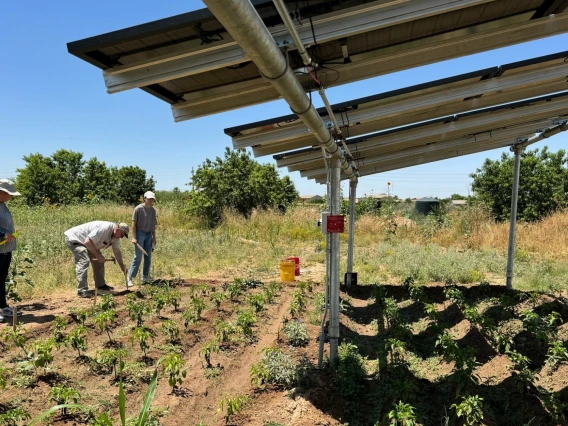Agrivoltaics: Food, Energy, and Water Solutions
Goals
Within this VIP, we will be tackling real and important challenges to build towards more sustainable food, energy, and water futures. Each of these food, energy, and water systems are extremely sensitive to a warming climate, and projections of more erratic precipitation will only add to these pressures. We are building the interdisciplinary field of agrivoltaics—the concept of colocating agriculture and photovoltaics (renewable energy from solar panels) as one potential solution.
Issues Involved or Addressed
Students will conduct research to address one or more of the following interrelated questions, including:
- How does atmospheric warming impact changes to food crop performance, and how can agrivoltaics relieve some of this stress?
- How much water savings can we achieve in an agrivoltaics approach without negatively impacting food production?
- Which crops are most suited for this approach?
- How does this approach boost the soil microbiome and the missions of sustainable agriculture?
- How much do these trends and patterns vary among crop species and geography (where does agrivoltaics work best / least well)?
- How can we design better solar arrays to balance light capture for energy production vs. light transmission to plants for food production?
- What do decision makers (farmers, politicians, energy producers, etc.) see as challenges and opportunities for agrivoltaics?
This project involves working together to bring together fresh ideas, knowledge, and ways of thinking to solve some of the biggest challenges of our generation!
Methods and Tech
All students will be trained in any methods required for participation in the Agrivoltaics VIP, which may include:
- Field measurements of photosynthesis and transpiration in plants
- Measures of plant water stress
- Installation of sensors and instrumentation
- Measures of crop production in the field
- Statistical data analysis and visualization
- Science communication to kids and adults and through social media
- Data curation and archiving
- Scientific programming (R, Python, etc.)
Academic Majors of Interest
Open to all majors, with particular interest in the sciences and mathematics, including:
- School of Natural Resources and the Environment
- Ecology & Evolutionary Biology
- Geography
- Computer Science
- Data Science
- Environmental Science
- Environmental Engineering
- Biosystems & Systems Engineering
- Sustainable Built Environments
- Sciences: Physics, Atmospheric, Hydrology, Soil, Geo, Microbial
- Technology
- Math
- Science, Technology, and Society
- Environmental Economics
- Health Sciences
- iSchool
Preferred Interests and Preparation
- Self-motivated
- Comfortable with uncertainty
- Work well independently and in teams
- Passion and dedication
- Creativity, collaboration, and leadership skills
- Organization and attention to detail
Application Process
To express interest in this team, please complete the VIP Interest Form and select "Agrivoltaics: Food, Energy, and Water Solutions"
Team Advisor
In the News

UArizona’s Greg Barron-Gafford Leads Breakthrough Solar Farming Research
As Arizona faces record-breaking heat and ongoing drought, researchers are turning to innovative solutions to protect crops and conserve water. Greg Barron-Gafford, Ph.D., a professor at the University of Arizona, is at the forefront of this effort through pioneering agrivoltaicsgrowing crops beneath solar panels. His research shows this method not only shields plants from extreme sun but also significantly boosts water efficiency and even crop yield. Read More Here

